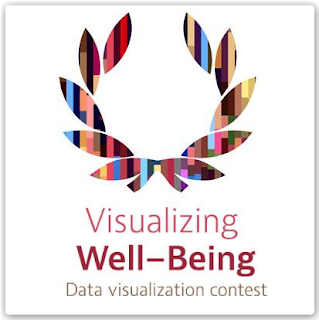Data Visualization Contest
There are a couple of big announcements to make on Wikiprogress this week. First of all, we are running a Data Visualization Contest over the summer called "Visualizing Well-being", with the prize for three winners of a paid trip to Mexico in October this year to attend the 5th OECD World Forum.
The aim of the contest is to encourage
participants to use well-being measurement in innovative ways to a) show how
data on well-being give a more meaningful picture of the progress of societies
than more traditional growth-oriented approaches, and b) to use their
creativity to communicate key ideas about well-being to a broad audience.
Contest entrants are asked to create an
infographic or data visualisation that addresses one or more of the following
questions:
- How do well-being levels vary between countries, or within countries?
- How do well-being levels vary for different population groups (e.g. for young people, the elderly, by gender, etc.)?
- Why is it important to look beyond purely economic indicators (such as GDP) for a better picture of people’s current or future well-being?
- How can the multi-dimensionality of well-being be effectively communicated to the general public?
Entries will be welcomed in two
categories:
1. Interactive
visualisations
2. Static infographics
and visualisations
Entrants are free to use any publicly
available data (either official or non-official statistics) to create their
entry. Entrants can choose their own definition of well-being and select their
data accordingly from publicly available data sources. They are also free to
use existing well-being indices and dashboards for inspiration, as long as they
use the existing data to create their own original visualisation.
The competition is open to all
individuals, both amateurs and professionals. We particularly want to encourage
the participation of young people and at least one of the prizes will be
reserved for under 26-year olds.
To find out more, visit the contest website here.
We look forward to seeing your entries!
If you manage a data resource that could be useful to include on the contest website, or on our Wikiprogress Data Portal, please let us know at info@wikiprogress.org
Wikiprogress Online Consultation on Youth Well-being: Summary Report
The first
Wikiprogress Online Consultation was a big success and we thank all of you who
took part. The consultation had around 300 registered participants and over 500
comments.
A summary report was
produced, summarising some of the key points made in the consultation, and can
be downloaded here.
The consultation
findings and aspects of Youth Well-being more generally were discussed at a
special session at the OECD Forum in Paris on 2 June. Marianna
Georgallis, Policy and Advocacy Officer from the European Youth Forum (one of
the consultation partners) outlined some of the main issues and led the
discussion. The session, titled “What Does Youth Well-Being Really
Mean?” was attended by around 50 people from the Forum, with many youth participants,
and there was a lively discussion around the questions raised by the
consultation.
Some of the main
takeaways from the consultation and the session included:
Studying youth
well-being is important because a half of the world’s population is under 30
years old.
- Youth well-being matters not only for young
individuals themselves, but also for their families, communities and
countries: countries that are more youth-inclusive tend to be more
prosperous, while those that exclude youth tend to have higher crime and
more social instability.
- Defining “youth’ is not straightforward as
youth is a period of transition from childhood to adulthood, and from
dependence to independence. For some youth means under 24 years, for
others under 35. While youth age bands are somewhat arbitrary, there is
nonetheless a need for greater precision when talking about youth and
their needs: the needs of under-10 year olds are not the same as a 25-year
old, for example.
- Parents and guardians play a crucial
role in youth well-being, but it is important that role is supportive
rather than coercive.
- Youth participation in policy is important,
and social media is a good ‘space’ for this. Many young people feel that
adults don’t take them seriously. However, examples such as Obama’s
2008 presidential campaign as well as youth councils and university groups
show that youth are willing to participate. As
noted previously, social media can harness this willingness if older
generations and governments choose to listen.
- Young people’s rights need to be strengthened
as regards a labour market which depends heavily on the labour market:
remuneration and opportunities for learning need to be improved and
prioritised.
To read more on the
consultation, download the report here.
We would also like to thank our Consultation Partners for their input and support:


